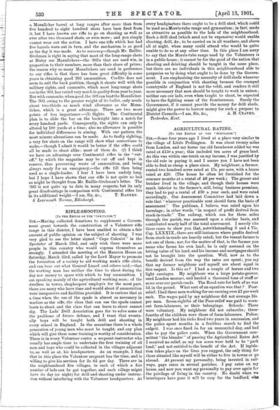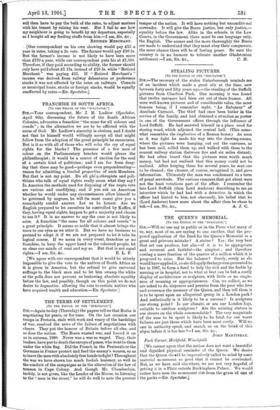AGRICULTURAL RATING.
[To THE EDITOR OP THE "SPECTATOR."] SIR,—Some four years ago I lived at a place very similar to the village of Little Pedlington. It was about twenty miles from London. and my house (an old farmhouse added to) was rated at 2150 a year; this included ten acres of grass land. As this was within one-tenth on my income, I was justified by the old rule in paying it, and I assure you I have not been able to find as cheap a place since. My neighbour, a farmer, rented two hundred acres rated at 17s. per acre, with a house rated at 220. (The house he often let furnished for the summer months at a rental of 26 per week.) The grocer and butcher lived in the village, and though their houses were much inferior to the farmer's, still, being business premises, they had to pay a rental of 230 a year each, and were rated accordingly. Our Assessment Committee had laid down a rule that "wherever practicable rent should form the basis of assessment." The publican. I believe, was rated upon his barrelage ; in other words, in respect of profit derived from stock-in-trade." The railway, which ran for three miles through the parish, was assessed upon a similar basis, .and contributed nearly half of the total assessment. I merely, cite these cases to show you that, notwithstanding 3 and 4 Vic. Cap. LXXXIX., there are still instances where profits derived from stock-in-trade are heavily rated; but the tenant farmer is not one of them; nor, for the matter of that, is the farmer you name who farms his own land; he ia only assessed on the letting value of his land, and his income and mortgages should not be brought into the question. Well, now as to the benefit derived from the way the rates are spent; you say that my farmer neighbour and myself are about equal in this respect. Is this so ? I had a couple of horses and two light carriages. My neighbour was a large potato-grower, used London manure, and hauled a thousand tons a stuff or more over our parish roads. The Road-rate for both of us was 5d. in the pound. What sort of an equation was that ? Poor- relief : I had. three men working for me earning over 21 per week each. The wages paid by my neighbour did not average 16s. per man. Seven-eighths of the Poor-relief was paid to worn- out farm-labourers, or their belongings. Schools : These were voluntary. My neighbour did not subscribe; three- fourths of the children were those of farm-labourers. Police: My neighbour had his ricks fired two years in succession, and the police spent months in a fruitless search to find the culprit. I was once fined 5s. for an =muzzled dog, and had also to pay the police costs. When the Government com- mitted "the blunder" of passino. the Agricultural_ Rates Mt I received no relief, as my ten acres were held to be park land," and not entitled to the benefit of the Act. If legisla- tion takes place on the lines you suggest, the only thing for those situated like myself will be either to live in towns or go abroad. At present my personalty, being invested in rail- ways, pays rates in several parishes. I pay ra.tea on my house, and now you want my personalty to pay over again for the privilege of living in the country. No doubt when we interlopers have gone it will be easy for the landlord, who will then have to pay the bulk of the rates, to adjust matters with his tenant by raising his rent. But I fail to see how my neighbour is going to benefit by my departure, especially as I bought all my feeding stuffs from him.—I am, Sir, &c., • [Our correspondent on his own showing Would pay £15 a year in rates, taking a 2s. rate. The fanner would pay £10 5s. But the farmer's income is not likely to have been more than E170 a year, while our correspondent puts his at 4,500. Therefore, if they paid according to ability, the farmer should only have paid about 21 13s. instead of 210 5s. while "Retired Merchant" was paying £15. If "Retired Merchants" income was derived, from railway debentures or preference stocks it was not affected by the rates on railways. Consols or municipal loans, stocks or foreign stocks, would be equally unaffected by rates.—En. Spectator.]







































 Previous page
Previous page